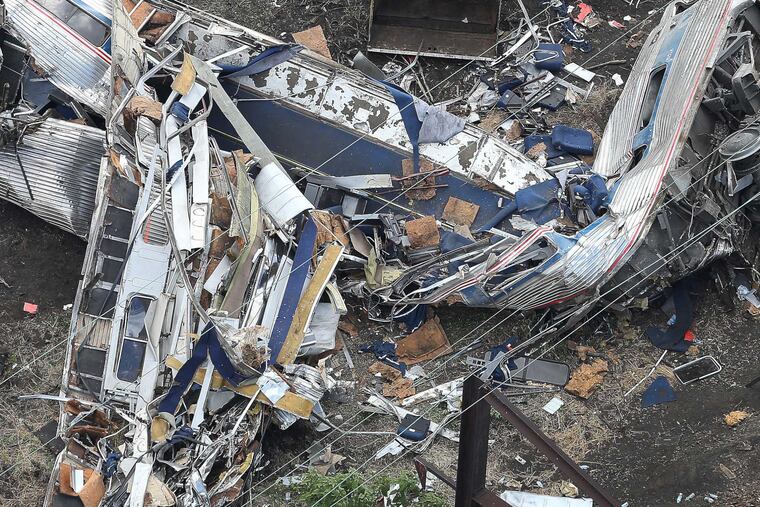No charges against Amtrak engineer who derailed train, killing 8
The Philadelphia DA finds the evidence didn't rise to a criminal offense, ending a two-year probe. The engineer, Brandon Bostian, says he doesn't recall what happened.

The Philadelphia District Attorney's Office will not file criminal charges against an Amtrak engineer who was operating a train that derailed north of 30th Street Station in 2015, killing eight.
"We cannot conclude that the evidence rises to the high level necessary to charge the engineer or anyone else with a criminal offense," a statement from the DA's office said.
The statute of limitations for a possible charge, reckless endangerment, expires on Friday, the two-year anniversary of the derailment.
The engineer, Brandon Bostian, 34, has told federal investigators he doesn't remember exactly why he accelerated a seven-car train as he approached a bend in the tracks in Philadelphia on May 12, 2015. The derailment killed eight people and injured more than 150 others. Deaths and serious injuries were concentrated in or near Car 1.
Bostian's lawyer, Robert Goggin III, declined to comment. Bostian did not reply to a phone call and text message.
Amtrak has taken responsibility for the crash and has since installed on its Northeast Corridor rails an automatic braking system that would have prevented the derailment. It has settled claims with 127 people, and a process is underway to divide an agreed-upon settlement amount of $265 million.
Bostian accelerated Amtrak Train 188 to 106 mph, more than twice the speed posted for that stretch of track, according to findings by the National Transportation Safety Board.
He had no drugs or alcohol in his system and was not distracted by a cellphone, according to the NTSB. The federal agency's review concluded that he lost "situational awareness," probably because of radio chatter about a rock hitting a SEPTA train near the Frankford Curve shortly before the derailment. An engineer relies on his knowledge of the twists and turns specific to each stretch of track while navigating a train, and the NTSB suggested Bostian may have become confused about where he was on the track.
The criminal investigation has been underway for almost two years, and in its statement the District Attorney's Office detailed the steps that law enforcement took to review the circumstances of the crash.
Two assistant district attorneys from the office's homicide unit worked with Philadelphia police and Amtrak officials and consulted with the NTSB during their investigation.
About a year ago, the NTSB released its own conclusions on the causes of the crash, and the assistant district attorneys reviewed the extensive documentation produced by the federal investigators.
They also rode in the cab of a train following the route Train 188 took and reviewed the audio tapes of Bostian's radio communications and cellphone records before the derailment.
A spokesman for District Attorney Seth Williams, Cameron Kline, would not comment on why the review of Bostian's actions took two years.
The DA's office said there was not evidence to prove Bostian knowingly disregarded a "substantial and unjustified risk," a standard a prosecutor would have to meet to obtain a conviction for criminal recklessness.
Bob Mongeluzzi, a Philadelphia lawyer representing some of the people injured in the derailment, criticized the decision not to charge. He had wanted to see Bostian be put before a jury.
"This is a sad day for railroad safety in America and for the justice system when Engineer Bostian is allowed to resume his life without so much as a speeding ticket while others mourn the loss of loved ones and so many seriously injured survivors struggle in their daily lives," he said in a statement.
A Temple University expert in criminal law, Jules Epstein, disagreed, saying prosecutors made the right decision.
"That's a mistake, and although it had deadly consequences," he said, "it wasn't a reckless mistake as that term is defined by law."
He compared it to a tragic car crash where a driver strikes a person after turning around to check on a crying infant in a backseat.
"In plain English, getting distracted by news of rocks being thrown at a train and as a result not realizing you're before the curve instead of after it is not reckless under the law," Epstein said.
Bostian's status as an engineer remains unresolved. As of Friday, he was still listed by Amtrak as being on unpaid administrative leave, but still an employee. Amtrak has an internal disciplinary process that would apply in the case of a derailment, but the rail agency has not commented on the status of such a review, saying it will not comment on personnel matters.
Amtrak officials have not commented on law enforcement's decision not to charge Bostian, or said whether it will have any bearing on his status with the railroad.
Bostian, formerly a resident of Queens, N.Y., has been living since 2016 in Somerville, Mass., a Boston suburb.